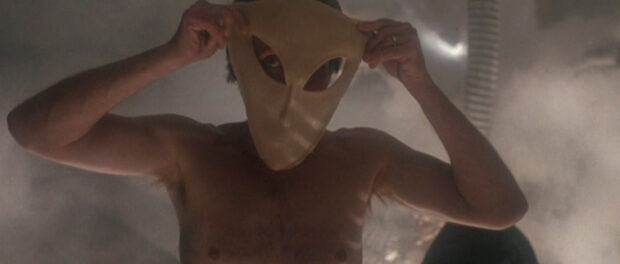Communion (1989)
[7]
Christopher Walken plays an alien abductee coming to grips with his experience in Communion. Walken’s character goes through denial, then embarrassment, then fear, and finally an odd sort of acceptance over the course of the film. The supernatural elements play out in bizarre, theatrical, but compelling ways — but most of the film centers on Walken’s emotional state and the conflict it causes with his wife and young son (Lindsay Crouse and Joel Carlson). After the family seeks the help of a hypnotherapist (Frances Sternhagen), they visit a support group of other abductees and begin to reconcile their feelings of violation and helplessness.
Communion benefits from a terrific cast, with Walken and Crouse playing a highly convincing married couple. Young Joel Carlson gives a surprisingly mature performance, and any appearance by the great Frances Sternhagen (Misery, The Mist) is a bonus. The screenplay is one of the most grounded and believable for a film dealing with aliens, always presenting the story from Walken’s and Crouse’s point of view and rarely indulging in sensationalism. The performances and writing combine for a compelling effect.
The film won’t satisfy viewers looking for a visceral third act that wraps things up with a bow. Communion is a film that asks more questions than it answers. Things get a bit didactic when Walken and Crouse try to shift their thinking to become ‘participants’ in their experience, instead of ‘victims’. (This, even after Walken is shown receiving the aliens’ rectal probe.) The alien effects are hit and miss. Their final appearance is purposefully surreal and absurd, a harsh turn of tone for a movie otherwise realistic and unsettling — but not an uninteresting one.
Based on the allegedly true story by Whitley Strieber; directed by Philippe Mora (The Beast Within, The Howling II).


